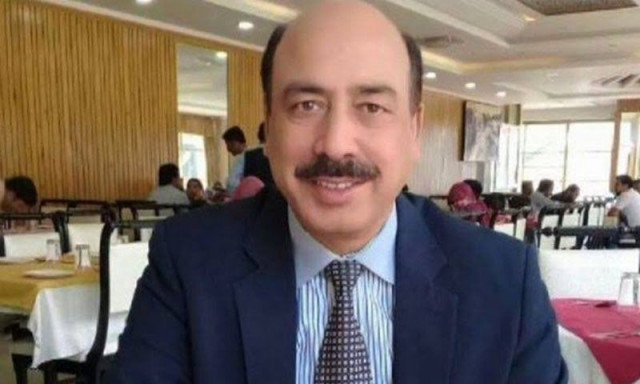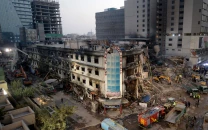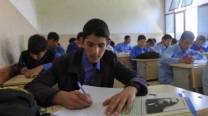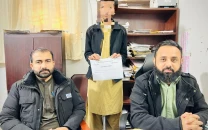SC lays down criteria for admissibility of Malik's video
CJP Khosa notes video cannot be of legal benefit to Nawaz unless it is produced before the IHC

Arshad Malik. SCREENGRAB
A three-judge bench, headed by Chief justice of Pakistan Asif Saeed Khosa and comprising by Justice Sheikh Azmat Saeed and Justice Umar Ata Bandial, in its 25-page verdict laid down the criteria to explain as to how a video would be considered as genuine and how this evidence could be proved before a court of law.
The chief justice while authoring the verdict framed five questions in the order. The court stated that proper forum to adjudicate the matter was the Islamabad High Court (IHC).
It also held that the standard of proof required in a criminal case was beyond reasonable doubt and any realistic doubt about an audio tape or video not being genuine might destroy its credibility and reliability.
About the question to determine the video as a genuine piece of evidence, the apex court stated that with the advancement of science and technology it was now possible to get a forensic examination, audit or test conducted through an appropriate laboratory so as to get it ascertained whether an audio tape or a video was genuine and such examination, audit or test could also reasonably establish if such an audio tape or video had been edited, doctored or tampered with.
However, the Sharif family's legal team believed that the apex court went beyond its jurisdiction, especially by telling the IHC as to how to proceed and what kind of quantum of evidence to call for before admitting evidence.
A senior PML-N lawyer while talking to The Express Tribune said pre-conditions for proving/admitting evidence in support of the video was virtually not possible to establish given the facts of this case.
He said instead of confining itself on the judge's issue, the apex court laid down the criteria which would affect the fate of an individual who was neither a party nor was called for a hearing in this matter.
Laying down requirements, the court noted that no audio tape or video could be relied upon by a court until the same was proved to be genuine and not tampered with or doctored.
A forensic report prepared by an analyst of the Punjab Forensic Science Agency in respect of an audio tape or video was per se admissible in evidence in view of the provisions of Section 9(3) of the Punjab Forensic Science Agency Act, 2007.
It said under Article 164 of the Qanun-e-Shahadat Order, 1984, it laid at the discretion of a court to allow any evidence becoming available through an audio tape or video to be produced.
Even where a court allowed an audio tape or video to be produced as evidence, such audio tape or video had to be proved in accordance with the law of evidence.
"Accuracy of the recording must be proved and satisfactory evidence, direct or circumstantial, has to be produced so as to rule out any possibility of tampering with the record."
It stated that an audio tape or video sought to be produced as evidence should be the actual record of the conversation like as and when it was made or of the event as and when it took place.
The court noted that the person recording the conversation or event had to be produced. The person recording the conversation or event must produce the audio tape or video himself.
The audio tape or video must be played in the court. An audio tape or video produced before a court as evidence ought to be clearly audible or viewable. The person recording the conversation or event must identify the voice of the person speaking or the person seen or the voice or person seen might be identified by any other person who recognised the voice or person.
It stated that any other person present at the time of making of the conversation or taking place of the event might also testify in support of the conversation heard in the audio tape or the event shown in the video.
The voices recorded or the persons shown must be properly identified.
The evidence sought to be produced through an audio tape or video had to be relevant to the controversy and otherwise admissible.
Safe custody of the audio tape or video after its preparation till production before the court must be proved.
"The transcript of the audio tape or video must have been prepared under independent supervision and control. The person recording an audio tape or video may be a person whose part of routine duties is recording of an audio tape or video and he should not be a person who has recorded the audio tape or video for the purpose of laying a trap to procure evidence. The source of an audio tape or video becoming available has to be disclosed," it added.
The court stated that the date of acquiring the audio tape or video by the person producing it before the court ought to be disclosed by such person.
An audio tape or video produced at a late stage of a judicial proceeding might be looked upon with suspicion. A formal application had to be filed before the court by the person desiring an audio tape or video to be brought on the record of the case as evidence.
Video cannot benefit Nawaz
Earlier, the court noted that the relevant video could not be of any legal benefit to Nawaz Sharif unless it was properly produced before the IHC in the pending appeal, its genuineness was established and then the same was proved in accordance with the law for it to be treated as evidence in the case.
"There cannot be two opinions about the legal position that it is that court alone which can at present maintain, alter or set aside such conviction and sentence on the basis of the evidence brought on the record," stated the order.
The order stated that any commission constituted by the government or by this court, any inquiry or investigation conducted by the police or by any other agency and any probe into the matter by any other institution or body could only render an opinion in the matter of the relevant video which is treated by the law as irrelevant and it could not per se be treated as evidence for the benefit of Nawaz in his appeal pending before the IHC, stated the verdict authored by CJP Khosa.
The order stated that an appellate Court could take additional evidence under Section 428 of the CrPC. "Under this section, an appellate court can take additional evidence on its own or upon an application of a party to the appeal, ie the appellant, the state or the complainant but in both such cases the appellate court has to record its reasons as to why it thinks that taking of additional evidence is necessary."
It also stated that the necessity of taking additional evidence at the appellate stage should be felt by the appellate court itself and the same was not to depend upon what a party to the appeal thought of such necessity.
"After feeling the necessity of taking additional evidence and after recording reasons for such necessity, the appellate court may either take such evidence itself or direct it to be taken by a magistrate or, when the appellate court is a high court, by a court of session or a magistrate. Where the additional evidence is taken by the court of session or the magistrate, it or he shall certify such evidence to the appellate court and the appellate court shall then proceed to decide the appeal on the basis of the pre-existing evidence as well as the additional evidence lawfully becoming a part of the record."
The court noted that it was, thus, obvious that in the context of the present matter if the IHC either on its own motion or on an application submitted by the appellant namely Nawaz Sharif, felt the necessity of taking additional evidence in the form of the relevant video then it might record its reasons for feeling such necessity and might then follow the steps mentioned in Section 428 of the CrPC.
"It goes without saying that in such a case the relevant video may be taken as (additional) evidence only after complying with the requirements for proving a video before a court of law."
The court stated that either on its own motion or on an application submitted by the appellant namely Nawaz Sharif or any other party to the case then the IHC would decide as to whether the conduct of the Judge of the trial court depicted through the said video, if found to be objectionable, had caused any prejudice or not.
The court stated that if the high court came to the conclusion that the process of trial and the evidence recorded during the trial were not affected by the conduct of the learned judge of the trial court, then the IHC had the option either to reappraise the evidence itself and decide the appeal on its merits after reaching its own conclusions on the basis of the evidence available on the record or to remand the case to trial court for re-deciding the case after hearing of arguments of the parties on the basis of the evidence already recorded.
"We would not like to comment on these aspects any further as the choices available with the high court in the above mentioned eventualities would lie within the jurisdiction and discretion of the high court and such choices would be exercised by it on the basis of the facts found and the conclusions reached by it."
Regarding the conduct of the judge, the order stated that his admitted conduct emerging from that press release and the affidavit stinks and the stench of such stinking conduct had the tendency to bring a bad name to the entire judiciary as an institution.
"He had unabashedly admitted in the press release and the affidavit that he had a shady past and had skeletons in his cupboard for which he was vulnerable to blackmail, during the trial being conducted by him he had been holding private meetings with sympathisers of the accused person being tried by him, he was threatened and inducements were offered to him during the trial but he had not reported the same to any superior authority and had never considered recusing from the trial, after convicting the accused person in the trial he had met the convict at his residence in a different city, he had even met a son of the convict in a different country and finally he had tried to help the convict in his appeal filed against his own judgement by dictating some grounds of appeal and pointing out some stated weaknesses in the case against the convict convicted by him."
The court stated that such admitted conduct of the judge was shocking, to say the least, besides being abhorrent and offensive to the image of a judge in the society. His sordid and disgusting conduct had made the thousands of honest, upright, fair and proper judges in the country hang their heads in shame, it added.
The court expected that after his repatriation, appropriate departmental disciplinary proceedings shall be initiated against him by the Lahore High Court forthwith.



















COMMENTS
Comments are moderated and generally will be posted if they are on-topic and not abusive.
For more information, please see our Comments FAQ